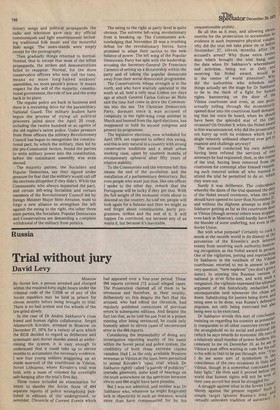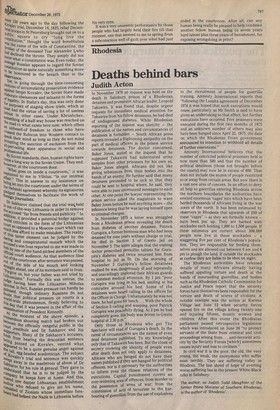Russia
Trial without jury
David Levy
Moscow By Soviet law, a person arrested and charged within the required forty-eight hours under the criminal code of the USSR or of any of the Soviet republics may be held in prison for eleven months before being brought to trial. There is no bail system and the wheels of the law grind slowly.
In the case of Dr Andrei Sakharov's close friend and human rights collaborator, Sergei Adamovich Kovalev, arrested in Moscow on December 27, 1974, for a variety of acts which the KGB decided to regard as deliberate and systematic anti-Soviet slander aimed at undermining the system, it is easy enough to understand that it could take up to eleven months to accumulate the necessary evidence. I saw four young soldiers staggering up an inside stairwell of the courthouse in Vilnius, Soviet Lithuania, where Kovalev's trial was held, with a mass of volumes for overnight safe-keeping after the trial's first day.
These tomes included an examination for intent to slander the Soviet • State of 694 separate reports of police wrongdoing published in editions of the underground, or samizdat, Chronicle of Current Events which had appeared over a four-year period. These 694 reports covered 172 actual alleged cases. The Prosecution claimed all of them to be erroneous and therefore, in their totality, deliberately so; this despite the fact that the accused, who had edited the chronicle, had regularly published corrections of previous errors in subsequent editions. And despite the fact too that, as he told his son Ivan in a prison meeting after being sentenced, he could only honestly admit to eleven cases of uncorrected error in the 694 reports.
Considering the impossibility of doing any investigative reporting worthy of the name within the Soviet penal and police system, the credibility of both these extreme claims vanishes. Had I, as the only available Western newsman in Vilnius at the time, been permitted to attend Kovalev's 'open trial' which Dr Sakharov rightly called "a parody of publicity" (parodia glasnost°, some kind of bearings on the truth somewhere on the spectrum between eleven and 694 might have been possible.
But I was not admitted, and neither was Dr Sakharov who, whatever he might forgivably lack in objectivity in such an instance, would more than have compensated for by his unquestionable probity.
Be all this as it may, and allowing eleven months for the prosecution to accumulate its evidence in such impressive physical voluine, why did the trial not take place on or before November 27, eleven months after the accused's arrest? Why those extra twelve days which brought the trial bang on° the date when Dr Sakharov's whereabouts and activities, being not in Oslo and receiving • his Nobel award, would he in the centre of world attention? WhkY did the authorities who schedule sac" things actually set the stage for Dr Sakharov to be in the thick of a fight for barna° rights, hammering on the door of the Vilnius courtroom and even, at one Poirl,t` actually yelling through the momentarnI opened door into the courtroom itself deinantl; ing that his voice be heard, when he shoul° have been the splendid star of the Oslo occasion? On October 9, when the Nobel award to him was announced, why did the prosecution not hurry up with its evidence which not a single remotely unbiased observer ever got to examine and challenge anyway? The accused conducted his own defence, having been refused the services of tw° attorneys he had requested; then, in the coat5! of the trial, having been removed from tri' courtroom for contempt after himself requesting such removal unless all who wanted t° attend the trial be permitted to do so, Which they were not. Surely it was deliberate. The coincidence whereby the dates of the trial spanned the date, of the Nobel award ceremony, when the Via,' should have opened no later than November 21' and without the slightest attempt to stop Pr Sakharov getting as far as the courtroom (WI in Vilnius (though several others were stop?e'' even back in Moscow), could hardly have been the blunder of some underling, not even in the Soviet Union. But with what purpose? Certainly to cock a snook at the outside world in its dismay at the prevention of the Kremlin's arch internal enemy from receiving such authority-bestoWing recognition as the Nobel award in Pei's°. One of the vigilantes, jeering and reproaching Dr Sakharov in the vestibule of the Vilnit15 courthouse, retorted to me in answer to this very question: "nam naplevat" (we don't give itt damn). In uttering this Russian version 0' national je m'en fiche-ism, and with such a vengeance, the vigilante expressed the ultirnate, argument of this historically embattled 101 unconquerable land whenever the chips ared down. Substituting for justice being done, an being seen to be done, was Russia's defensive jingoism, not only being exercised but als° being seen to be exercised. Dr Sakharov avoids this sort of conclusn3a,' insisting on regarding his country as potential; ly comparable to all other countries except f,°,. the stranglehold on its social and political in', (which he says retards its economic life too) cns a relatively small number of power-holders14.1n comment to me on December 10, as he satla Vilnius's post office waiting in vain for his cal' to his wife in Oslo to be put through, was; the I do see some sort of symbolism in ci coincidence of the two occasions in Oslo an, Vilnius, though in a somewhat concealed arin,_ue hazy light." He then said it proved before tof world that human rights will not be won
their own accord but must be struggled for;
o'09 o'09 struggle against what in the Soviet LW° a. Merely against the present regime? Sucho simple target ignores Russia's long a A virtually unbroken tradition of autocracy. "
mere 150 years ago to the day following the
°valev trial, December 14, .1825, rebel Decemuust troops in St Petersburg brought out on to a PUblie square to cry "long live the constitution," thought the word honstitutsia as the name of the wife of Constantine-, the brother of the deceased Tsar Alexander I, who knad declined the throne. They simply did not ,Talw what a constitution was. Even today, the caverao Russian appears to regard the Soviet tonstitution as quite naturally something more ° be honoured in the breach than in the °bservance. Yet, in going through the time-consuming /notions of accumulating prosecution evidence gaILrrist Sergei Kovalev, the Soviet State made `roorate obeisances and salaams to the forms Orrlegality In Stalin's day, this was only done ' Purposes of staging show trials, which at ',.esast had the virtue of saving a lot of useless hour in other cases. Under Khrushchev, sornething of a half-way house was reached on tile road to what exists here now, which offers all unheard-of freedom to those who have Crossed the Rubicon into Western contact to sPeak their mind as long as they do not mind awecepting the sanction of exclusion from the I-Pervading state apparatus in social and PMessional life. _ BY Soviet standards, then, human rights have ukoine a long waY in the Soviet Union. They end, uoWever, at the courtroom door.
at goes on inside a courtroom," it was arab-led to me in Vilnius, "is our inteinal This in answer to my insistence on
let into the courtroom under the terms of Ine ledged Helsinki agreement whereby its signatories
P t
hemselves to facilitate the work of
P t
hemselves to facilitate the work of journalists.
in r)r Sakharov claimed that the trial was,held °Lit-of-the-way Lithuania in order to remove a'de .accused "far from friends and publicity." In ‘evoodriltdi°°, it provided a potential hedge against criticism in the form of the Lithuanian irp,11„rt,_ as uPposed to a Moscow court which can cy."`" less afford to make mistakes. The reality c1:1 this latter element can be judged by the acc,r1„11g and conspiratorial remark which the ```sed's son Ivan reported to me was made to
bY one of the hand-picked members of the otreial court audience. As that audience filed
014 of the courtroom after sentence was passed, str,:°f the side of his mouth and looking ,,rgight ahead, one of its members said to Ivan: Li:give us, but your father was not tried by jto aunians." Formally this was untrue, the io'ge having been the . Lithuanian Mikolas c'tas. In fact, Russian pressure can hardly be
°said, though Ordinary Russians do not wuoubt that political pressure on courts is a
thisrld-wide phenomenon, firmly believing to day that it was present in the affair of the sination of President Kennedy. tre7lItA the moment of the above episode, a beorodous shouting match had broken out eo„:, en the officially vengeful public in the t ivestibule and Dr Sakharov and his fre?h°rtcers. Many of Dr Sakharov's accusers, bei„-,11..°O1 hearing the draconian sentence apn.7.5 Passed on Kovalev, vented what
thd to be a quite genuine anger against
Of 1;41. egg-headed academician. The subject 8,,v`"ovalev'5 trial and sentence was quickly saL,eft/t aWay in the maelstrom of abuse of Dr
arny for his role it% general. They gave to ooaclerstand that he is to be judged by the
rn:LlanY he keeps here at home. And this, atith-nu One dapper Lithuanian establishment consist who refused to give me his name, of Zionists whose immediate forehad helped the Nazis in Lithuania before
his very eyes. It was a very unseemly performance by those people who had largely held their fire till that moment, one that seemed to me to spring from a subconscious well of guilt over what had just' ended in the courtroom. After all, can any human being really be pleased to help condemn another fellow human being to seven years hard labour plus three years of banishment, for exposing wrongdoing in print?



































 Previous page
Previous page